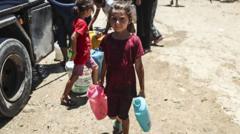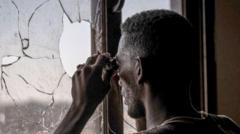Following the arrest of Ataullah, the leader of the Arakan Rohingya Salvation Army (ARSA), tensions remain high as over a million Rohingya refugees languish in Bangladesh, exacerbated by violent clashes and a historical backdrop of ethnic cleansing initiated by Myanmar's military.
Arrest of Rohingya Armed Group Leader Highlights Ongoing Crisis

Arrest of Rohingya Armed Group Leader Highlights Ongoing Crisis
The detention of ARSA leader Ataullah in Bangladesh underscores the plight of the Rohingya community fleeing persecution in Myanmar.
In a significant development in the ongoing Rohingya humanitarian crisis, Ataullah, the commander of the Arakan Rohingya Salvation Army (ARSA), was apprehended in Bangladesh earlier this week. His arrest is part of a broader crackdown on the group, which has been linked to raids that triggered severe repercussions in Myanmar, leading to what many have termed a genocide against the Rohingya minority.
Bangladeshi police reported that Ataullah was captured during a raid in Narayanganj District, just outside the capital city, Dhaka. Accompanying him in custody are nine other alleged members of ARSA, all facing charges under the nation's strict anti-terrorism legislation. This legal move underscores the Bangladeshi government’s stance on maintaining order, as the region has seen unsettling clashes fueled by various militant factions, including ARSA.
The background to this arrest is fraught with tension. Coordinated attacks by ARSA insurgents in 2016 and 2017 provided a justification for the Myanmar military to conduct devastating operations against the Rohingya population. This military campaign involved widespread atrocities, including arson, sexual violence, and mass killings, eradicating entire Rohingya villages and displacing over a million individuals into Bangladesh, subsequently creating one of the world’s largest refugee settlements.
As the Rohingya crisis continues, many of the displaced live in overcrowded conditions, facing violence and uncertainty in makeshift camps. Gunfights among rival groups in these refugee settlements have further escalated the already difficult situation, contributing to a cycle of radicalization among the youth, who grow up in an environment marked by trauma and loss.
As the international community watches closely, the implications of Ataullah's arrest may ripple through the region, raising questions about security, humanitarian assistance, and the future of the Rohingya people who remain stateless and marginalized.



















